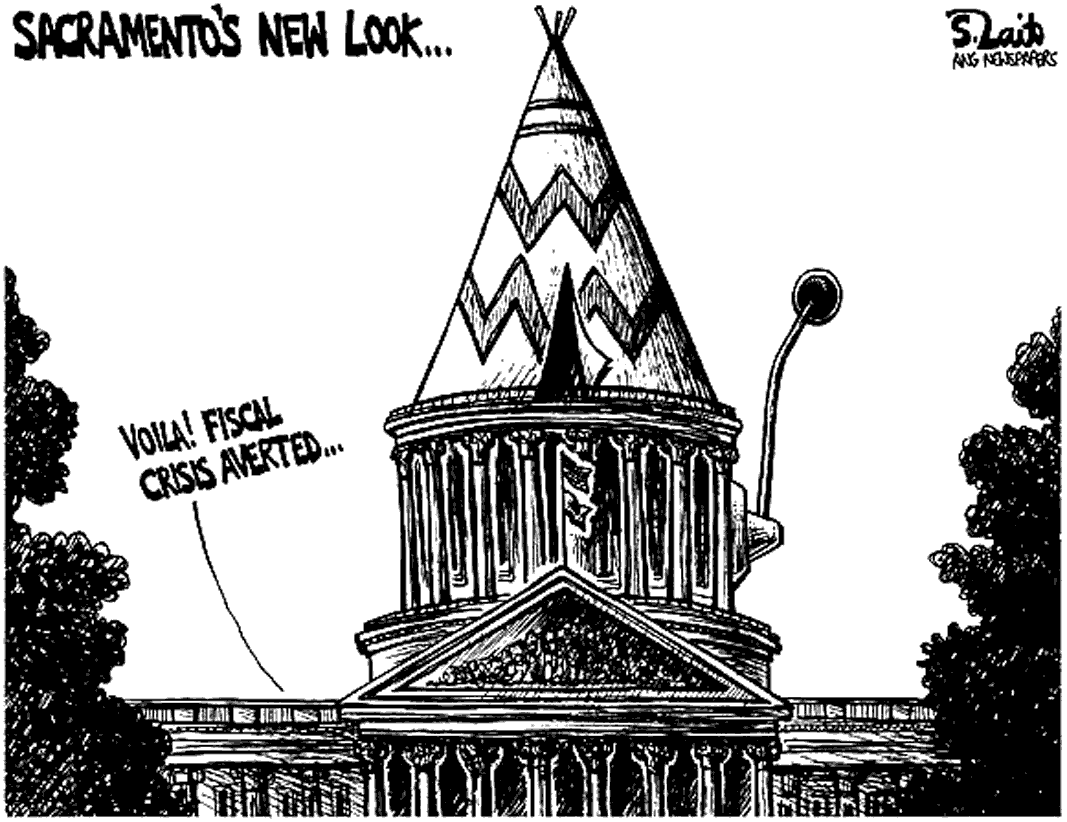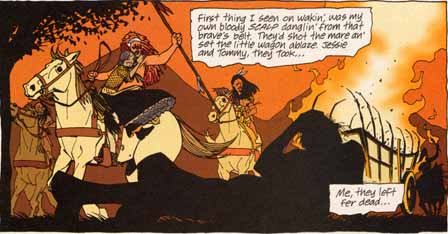
 By Rob Schmidt
By Rob Schmidt

 By Rob Schmidt
By Rob Schmidt
In one of Arnold Schwarzenegger's recent TV ads, his scary voice is heard saying: "Indian casino tribes play money politics in Sacramento: $120 million in the last five years."
Other sources have cited this $120-million figure repeatedly and uncritically. "California tribes...have poured more than $120 million into state political campaigns since 1998," wrote Rich Lowry in the New York Post. "The gaming tribes have spent more than $120 million over the past five years to support their pet candidates and pet ballot initiatives," wrote Joseph Perkins in the San Diego Union-Tribune. Even Indianz.com, a pro-Indian Web site, wrote that "tribes have donated $120 million to state politicians over the past five years."
The implication is that tribes have spent most or all of the $120 million on campaign contributions. They're supposedly buying access and influence in Sacramento, to spin the claim positively, or bribing officials to do their bidding, to spin it negatively. But few have questioned the $120-million amount.
People should question it, because the figure is either false or misleading, depending how you look at it. Let's break it down.
For starters, tribes spent $92 million of the $120 million on Proposition 5 in 1998 and Proposition 1A in 2000. They used the money not to influence California's politicians but to communicate directly with its voters. It was needed because of the huge amounts Las Vegas casino companies spent against these propositions: $9.5 million by Mirage Resorts Inc., $6.5 million by Circus Circus Enterprises Inc., $6.5 million by Hilton Hotels Corp., etc. (Source: California Secretary of State's report on Proposition 5.)
To reiterate, almost 80% of the tribes' money was spent not to peddle influence in Sacramento but to "peddle" ideas to voters. In response, Californians approved Proposition 5 by 62% to 38% and Proposition 1A by 65% to 35%. If winning a vote by more than 3 to 2 makes one a "special interest," we need to redefine the term. Any group supported by a large majority is a general interest, not a special interest.
That leaves $28 million for all other tribal campaign expenditures in California over the last five years. Not such an imposing figure, eh? And some of that went to support other ballot propositions, which again isn't Sacramento-based influence-peddling.
But let's assume it all went to politicians running for state office. At present California has 107 federally recognized tribes, 54 of which conduct gaming. A few gaming tribes are newcomers, so let's say about 50 gaming tribes contributed the remaining $28 million over five years.
Do the math. $28 million from 50 tribes over five years is $112,000 per tribe per year. Meanwhile, Schwarzenegger has pumped $6.5 million of his own money into his campaign for governor so far. He's raised another $7.1 million from executives doing business with the state and other "non-special" interests.
Tribal spending isn't out of line with the annual expenditures of major corporations, unions, and other well-heeled donors. For instance, on the same ballot as Proposition 5 was Proposition 9, the Utility Rate Reduction and Reform Act. Utilities and other corporations spent $40 million against it, including $17 million from Southern California Edison. Proponents could muster only $1.5 million to support Prop. 9 and it was defeated 73% to 27%.
How much more has Southern California Edison spent to bury consumer-oriented propositions and buy deregulation-minded politicians since 1998? Who knows? Schwarzenegger and his Indian-bashing brethren don't, or they'd be railing against the political power of utilities. Instead, they're jumping on the anti-Indian bandwagon.
But wait, there's more. California's 50-odd gaming tribes don't operate in lockstep. They're independent entities, sovereign nations. Many are led by pro-business Republicans or independents. Some have quit the California Nations Indian Gaming Association (CNIGA) because they don't like its assertive positions. Several were upset with the Viejas Band of Kumeyaay Indians' $1.5 million donation to Lt. Gov. Cruz Bustamante.
That $28 million in tribal contributions has gone to conservative as well as liberal candidates. We're seeing that in the recall, with state Sen. Tom McClintock getting donations second only to Bustamante's. Both McClintock and Bustamante support Indian gaming and sovereignty, but they have little else in common.

In fact, these politicians have radically different visions for the state of California. Undoubtedly they'd act differently on judicial appointments, land-use legislation, and other issues important to Indians. To treat 50-plus autonomous Native nations as if they're a political bloc, when clearly they're not, is the worst sort of stereotyping. It's racial profiling: "All Indians are the same."
Befitting his roles as a Germanic John Wayne, Schwarzenegger is thinking like a 19th-century cowboy. To him Indians are still trying to sneak up on people and scalp them in their sleep. Unfortunately, the numbers don't bear out his false, misleading, and vaguely racist claims. As an accountant, Arnold makes a great actor, and that's not saying much.
Other places to read this article
Indian Country Today (10/7/03)
MSNBC (10/8/03)
Related links
Top 15 reasons why Indians shouldn't vote for Arnold Schwarzenegger
Schwarzenegger: Indians full of "greed," "ripping us off"
Schwarzenegger ad: Gaming tribes should pay "fair share"
Schwarzenegger claims Indian tribes are "special interests"
The facts about Indian gaming
Too-powerful Indians
|
. . . |

|
All material © copyright its original owners, except where noted.
Original text and pictures © copyright 2007 by Robert Schmidt.
Copyrighted material is posted under the Fair Use provision of the Copyright Act,
which allows copying for nonprofit educational uses including criticism and commentary.
Comments sent to the publisher become the property of Blue Corn Comics
and may be used in other postings without permission.